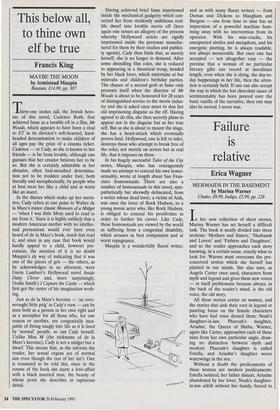This below all, to thine own elf be true
Francis King
MAYBE THE MOON by Armistead Maupin Bantam, f14.99, pp. 307 Thirty-one inches tall, the Jewish hero- ine of this novel, Cadence Roth, first achieved fame as a lovable elf in a film, Mr Woods, which appears to have been a rival to ET in its director's soft-hearted, hard- headed determination to make children of all ages pay the price of a cinema ticket. Cadence — or Cady, as she is known to her friends — is far from lovable, although one guesses that her creator believes her to be so. But she is certainly admirable in her abrasive, often foul-mouthed determina- tion not to be trodden under foot, both literally and metaphorically, by people who at best treat her like a child and at worst like an insect.
In the diaries which make up her narra- tive, Cady refers at one point to Walter de la Mare's minor classic Memoirs of a Midget — 'when I was little Mom used to read to me from it.' Since it is highly unlikely that a modern American mother with no intellec- tual pretensions would ever have even heard of de la Mare's book, much less read it, and since in any case that book would hardly appeal to a child, however pre- cocious, the mention of it is no doubt Maupin's sly way of indicating that it was one of the pieces of grit — the others, as he acknowledges in an afternote, were Gavin Lambert's Hollywood novel Inside Daisy Clover and, more surprisingly, Dodie Smith's I Capture the Castle — which first got the oyster of his imagination work- ing.
Just as de la Mare's heroine — 'an over- wrought little prig' in Cady's view — can be seen both as a person in her own right and as a metaphor for all those who, for one reason or another, are congenitally inca- pable of fitting snugly into life as it is lived by 'normal' people, so can Cady herself. Unlike Miss M (the nickname of de la Mare's heroine), Cady is not a midget but a dwarf. This means that, as she informs the reader, her sexual organs are of normal size even though the rest of her isn't. One is reassured to be told this, since in the course of the book she starts a love-affair with a black married man, the beauty of whose penis she describes in rapturous detail. Having achieved brief fame imprisoned inside the mechanical gadgetry which con- verted her from stridently ambitious real- life dwarf into lovable movie elf (here again one senses an allegory of the process whereby Hollywood actors are rigidly imprisoned inside the personae manufac- tured for them by their studios and publici- ty agents), Cady then finds that, as merely herself, she is no longer in demand. After some dwindling film roles, she is reduced to appearing in a theatrical troup, headed by her black lover, which entertains at bar mitzvahs and children's birthday parties. The chance of a second grab at fame only presents itself when the director of Mr Woods is about to be honoured for 20 years of distinguished service to the movie indus- try and she is asked once more to don her old imprisoning disguise as the elf. Having agreed to do this, she then secretly plans to appear not in the disguise but as her true self. But as she is about to mount the stage, she has a heart-attack which eventually proves fatal. Hollywood, one is left to infer, destroys those who attempt to break free of the roles, not merely on screen but in real life, that it imposes on them.
In his hugely successful Tales of the City series, Maupin, who has courageously made no attempt to conceal his own homo- sexuality, wrote at length about San Fran- cisco homosexuals. There are also a number of homosexuals in this novel, sym- pathetically but shrewdly delineated, from a writer whose dead lover, a victim of Aids, was once the lover of Rock Hudson, to a young movie actor who, like Rock Hudson, is obliged to conceal his proclivities in order to further his career. Like Cady, these homosexuals are viewed by the world as suffering from a congenital disability, which arouses as best compassion and at worst repugnance.
Maupin is a wonderfully fluent writer; and as with many fluent writers — from Dumas and Dickens to Maugham and Burgess — one from time to time has an impression of a powerful machine hum- ming away with no intervention from its operator. With his wise-cracks, his unexpected similes and metaphors, and his energetic plotting, he is always readable, not always memorable. But once one has accepted — not altogether easy — the premise that a woman of no particular literary gifts can record at inordinate length, even when she is dying, the day-to- day happenings in her life, then the atten- tion is certainly held. If one can also accept the way in which the hot chocolate sauce of sentimentality has been poured over the basic vanilla of the narrative, then one may also be moved. I never was.


























































 Previous page
Previous page